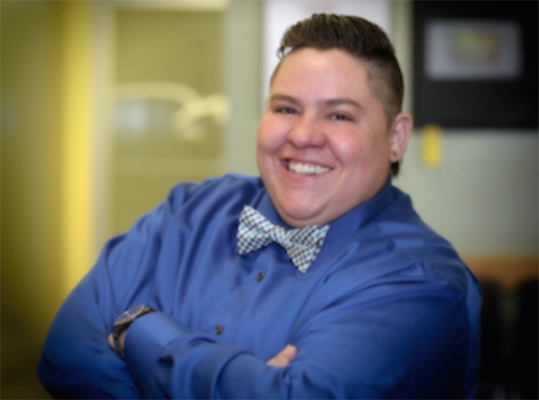ML Ruiz-Williams, Deaf & Hard of Hearing Services
ML Ruiz-Williams joined the WellPower eight years ago as a sign-language interpreter on the four-member Deaf & Hard of Hearing Services team. Fluent in American Sign Language and Signed English, the team integrates the cultural traditions and beliefs of the deaf community into its program. ML is a nationally certified interpreter through the Registry of Interpreters for the Deaf.
I was already an interpreter when I started working as a contract interpreter for the WellPower, initially for eight hours a month for team meetings and psychiatric appointments. After four years, I became a 20-hour-a-week part-time employee, then to 32 hours a week and now I work 40 hours a week. I work all across the system with many different teams, not just the Deaf & Hard of Hearing Services team.
About five years ago I attended the specialized mental health interpreting training in Alabama developed at their state mental hospital, one of the only places in the U.S. that offers licensure in the specialty of mental health sign-language interpreting. I brought this back and tailored it for our work at the WellPower. We also collaborated with the Colorado Commission for the Deaf and Hard of Hearing in starting the Colorado Daylight Partnership which developed Colorado’s “Standards of Care for Serving Deaf and Hard of Hearing Clients” in the areas of mental health and substance abuse.
Every day my job is different. Just this week, I will interpret a six-and-a-half hour training on trauma-informed care for children. I will interpret a psychiatric evaluation, various medication reviews, and doctor appointments with consumers whose primary care physician is a part of our integrated care team. I will also interpret a cultural diversity training, an emergency intake and assessments for elders who need to go into a nursing home. I also oversee scheduling other interpreters, interpret for classes in our NextChapter program, and do lots of outreach in our system to teach others how to work with the deaf and hard of hearing consumers.
The biggest challenge in my work in the deaf community is the stigma of mental illness. In the larger hearing community, it’s educating and collaborating with colleagues and others so they understand that the deaf community is a linguistic minority. They don’t consider themselves disabled, but they face systemic barriers. Our Deaf and Hard of Hearing team operates with this statistic in mind—that one-third of males and two-thirds of female deaf consumers experienced trauma before age five—before they even acquired language. In trauma-informed care, we don’t ask, “What’s wrong?” We ask, “What happened?”
It’s a privilege to work for an organization that strives for excellence at the national level. We have a long history of working with the deaf and hard of hearing, actually dating back to before the WellPower was founded. In this area and others, we’re doing things most community mental health centers have not yet begun to explore. It is an honor to be able to say I’ve contributed in my own small way.


